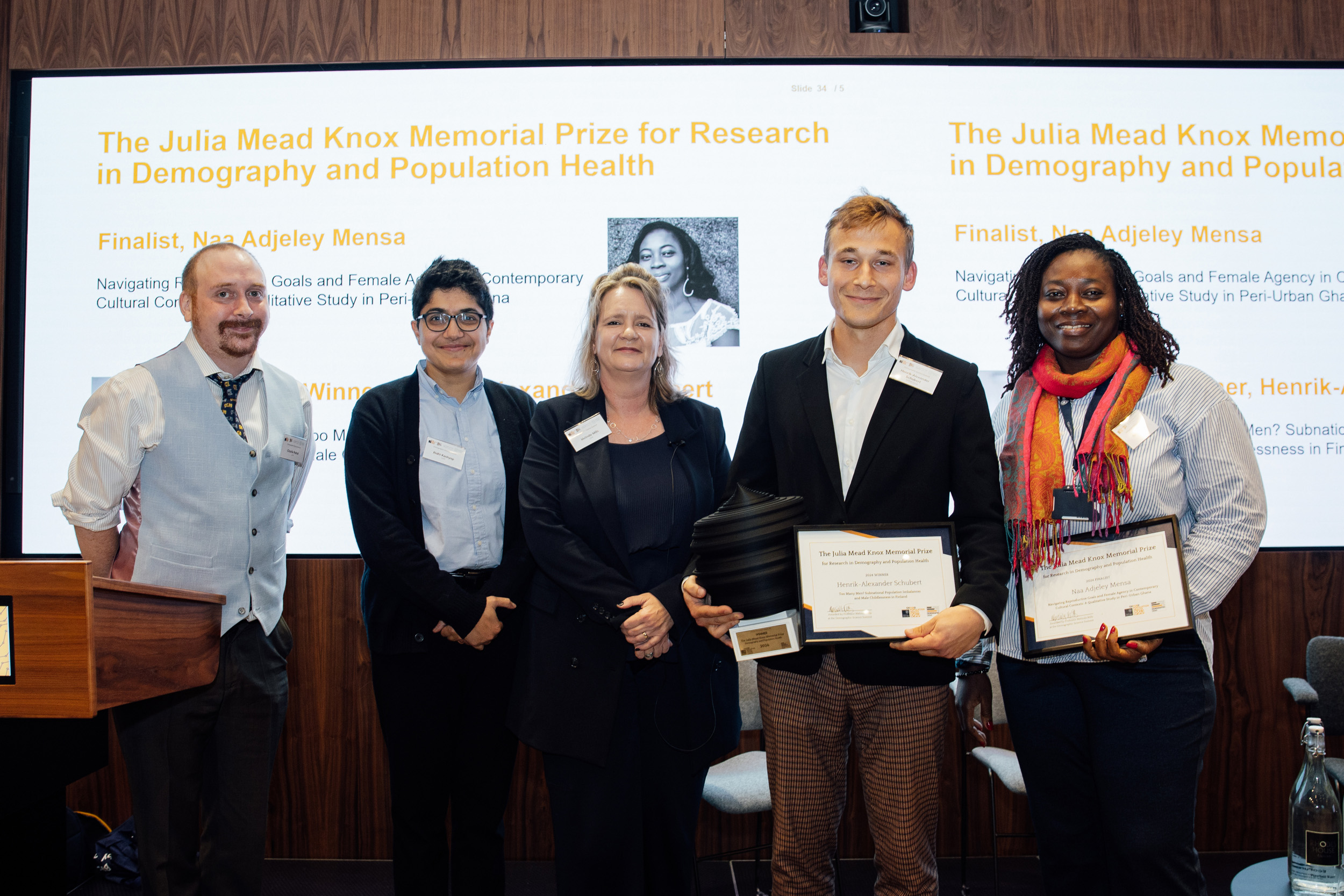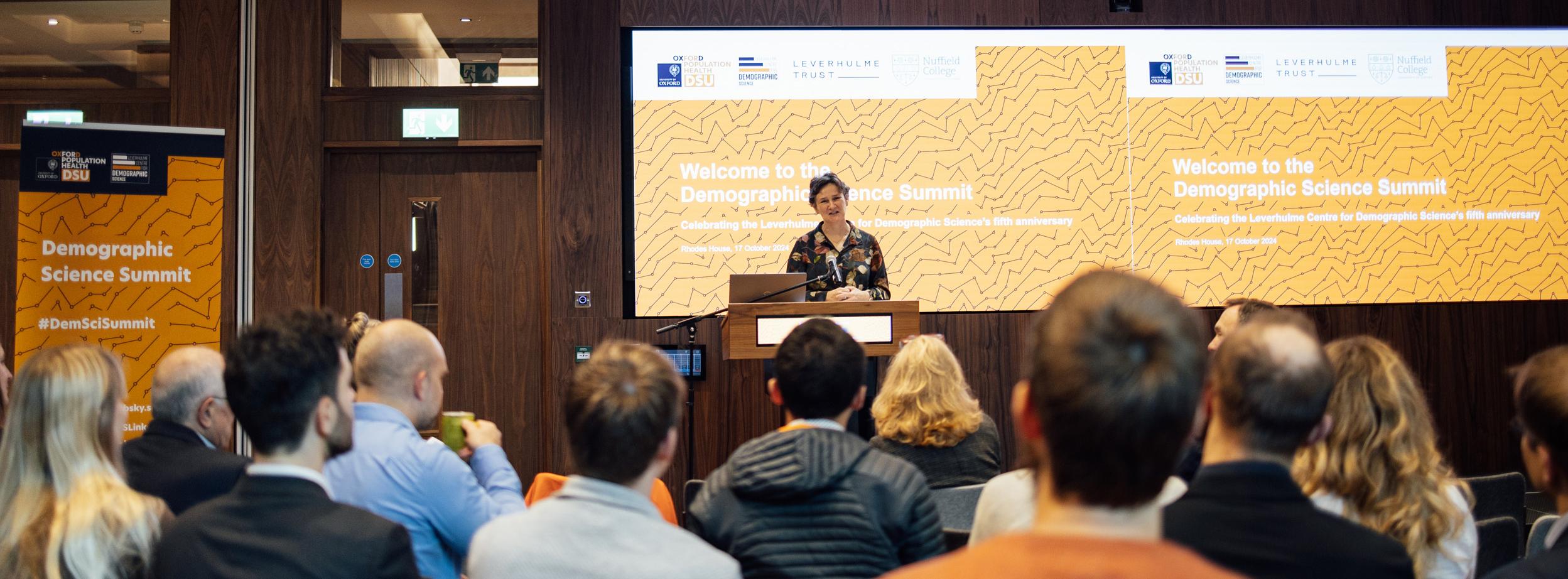On 17 October 2024, the Leverhulme Centre for Demographic Science hosted the inaugural Demographic Science Summit to celebrate five years of disrupting and realigning demography for the benefit of populations around the world.
The Demographic Science Summit welcomed experts across science, business and government to share in the achievements of the Leverhulme Centre for Demographic Science (LCDS) over its first five years, including establishing the Demographic Science Unit, and discussing its exciting future. Watch a summary of the day below and a shorter version on YouTube.
Celebrating five years
‘Without the support of the Leverhulme Trust, Nuffield College, Oxford Population Health and the University of Oxford, we wouldn’t exist. It was only possible to build this new interdisciplinary Centre in demography by getting the right people, leaving our comfort zone, freeing ourselves from stifling environments to find a better fit, making a real-world difference and staying ahead of the curve.’ – Professor Melinda Mills, LCDS Director
Professor Irene Tracey, Vice-Chancellor of the University of Oxford, opened the Summit by congratulating LCDS on its first five years, its bold interdisciplinary research, and noted, ‘You’ve grown enormously to about 60 people and have secured double the amount of grant money over five years. That doesn’t happen by accident. I’ve been here 35 years … and I know what excellence is required in order to achieve those numbers, and that doesn’t happen without really good leadership.’
The Centre’s interdisciplinarity and research excellence was further reinforced in introductory remarks from our funders the Leverhulme Trust and Nuffield College.
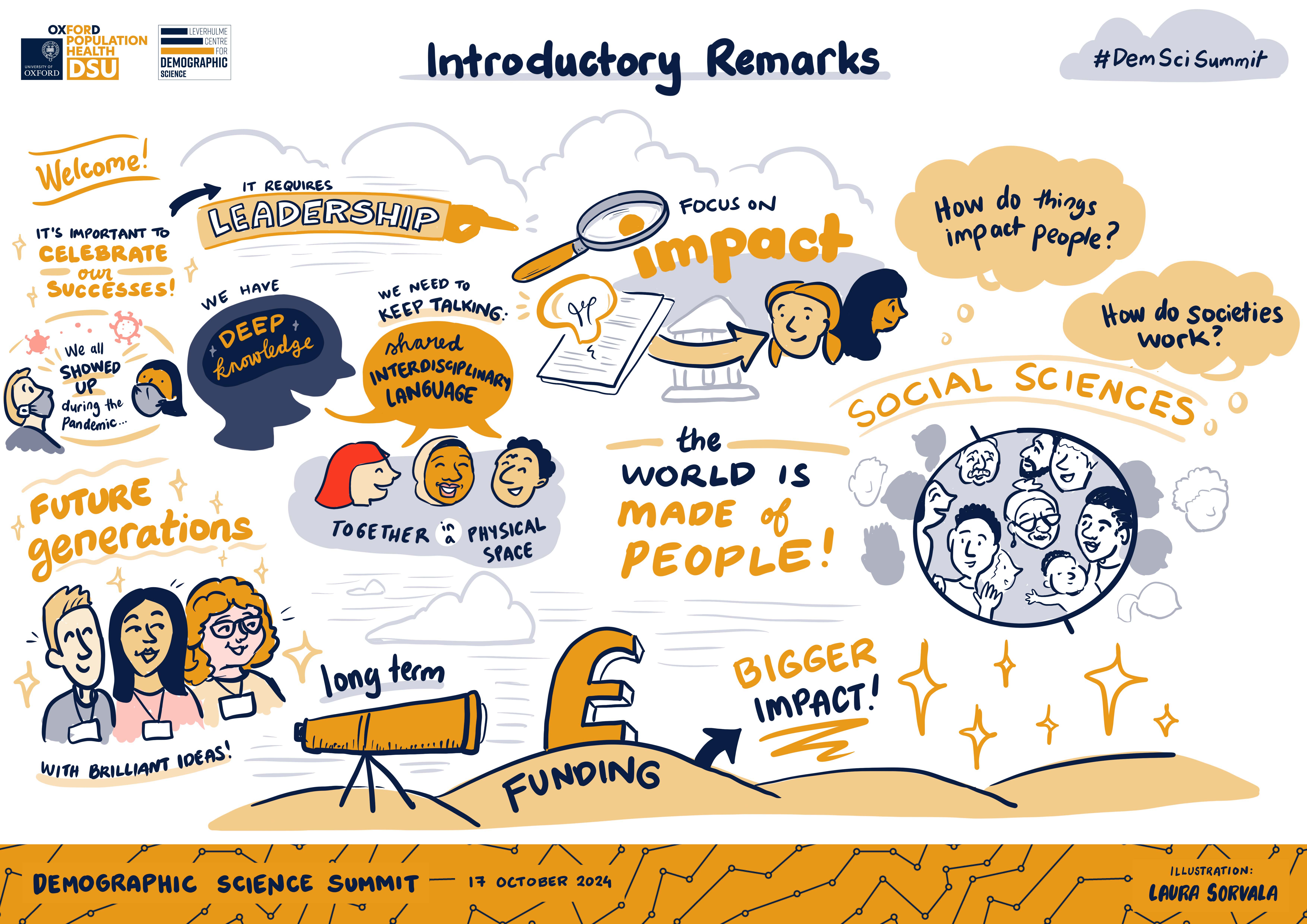
Professor Melinda Mills, Director of LCDS, celebrated the Centre’s key milestones over the first five years – including publishing over 350 publications and doubling our funding and scientific, economic and social policy impact – and thanked the Centre’s researchers and funders for making this possible. Find out more in Melinda’s blog, What I learned from building an interdisciplinary demographic science centre.
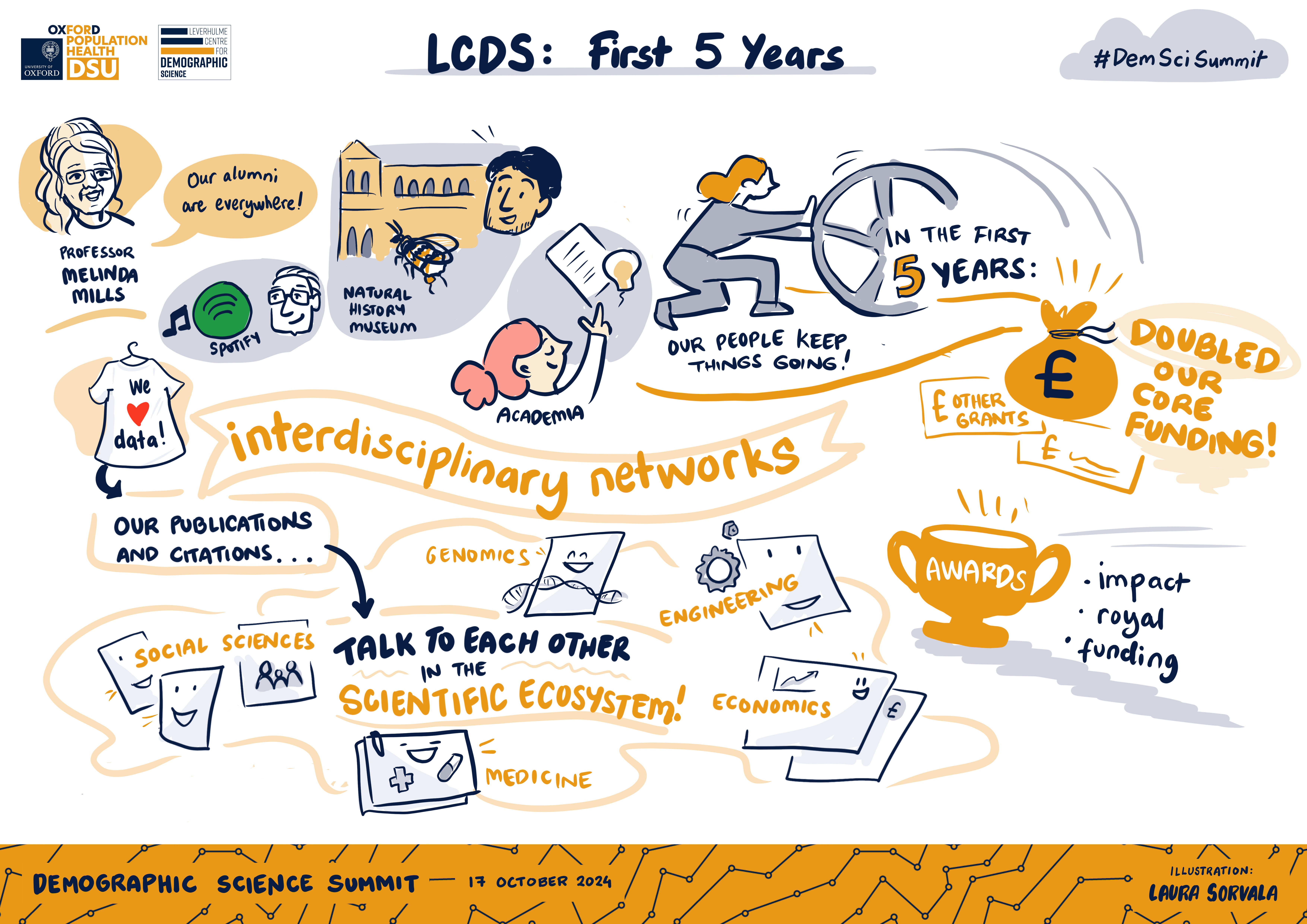
Our keynote speaker Bill Morneau, former Finance Minister of Canada (2015-2020) and former CEO of Morneau Shepell (now TELUS Health), praised the Centre’s entrepreneurial approach and the impact of its research on real-world policies, ‘I find the Centre to be very focused on issues that, from my perspective as a former Minister of Finance, can be critically important in the development and redevelopment of our social security systems.’
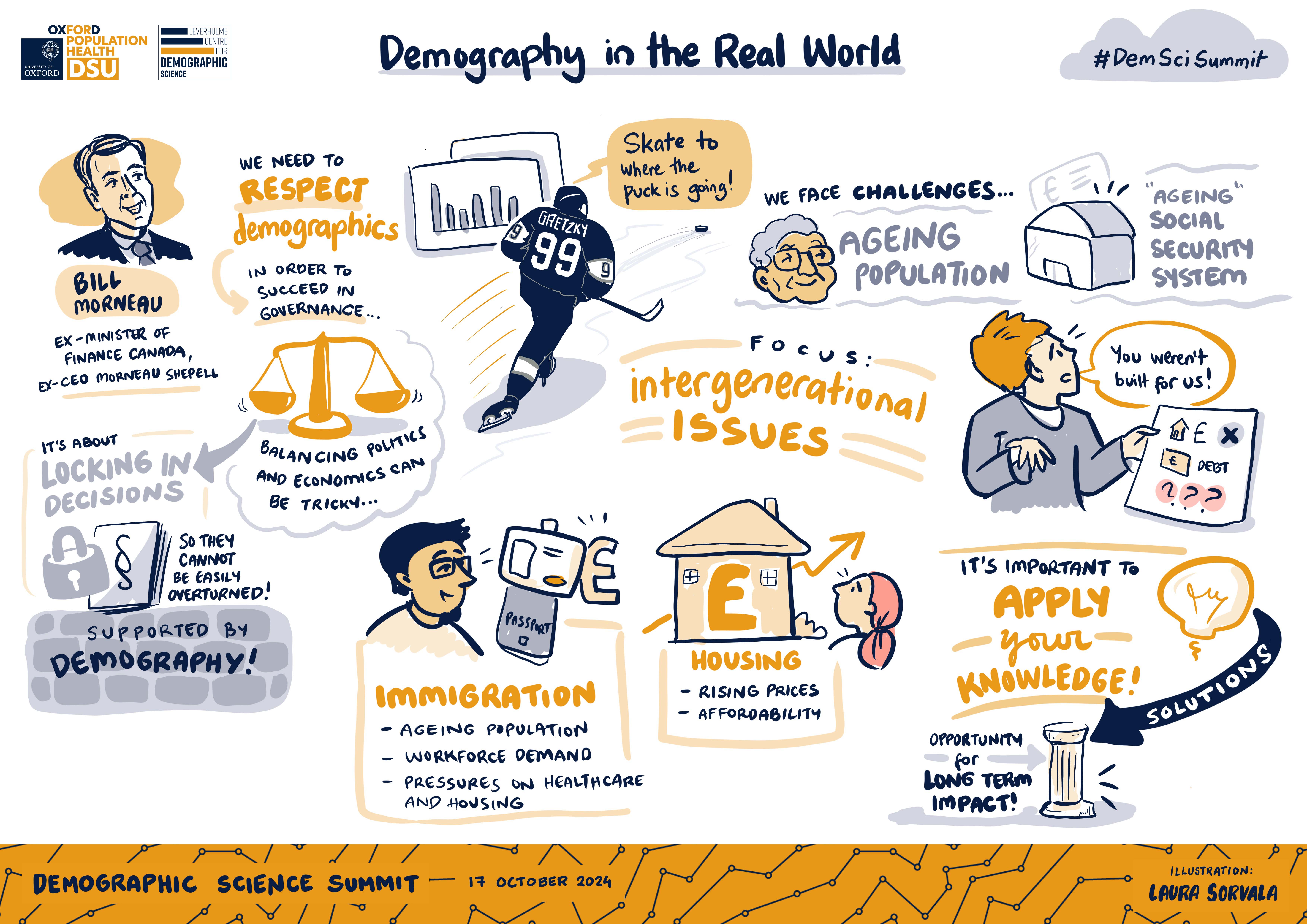
Demography in action
‘I’m particularly excited about the way LCDS is coming up with new and innovative ways of combining and applying data to some very different and difficult challenges.’ – Professor Anna Vignoles, Director of the Leverhulme Trust
The Centre’s innovative use of data to disrupt and realign demography was evident throughout the day, with flash presentations from LCDS researchers and panel discussions from leading experts in demography.
Our demography in action session highlighted how our work had direct links to policy including modelling population displacement during wars to support humanitarian aid (presented by Dr Douglas Leasure), changing educational policy by studying learning loss (Dr Mark Verhagen), and public health intervention modelling for whether vaccine certificates worked (Professors Melinda Mills and Jennifer Dowd). Dr Charles Rahal also explored how the Centre is tracking diversity in Genome-wide Association Studies in real-time.
Panelist James Arroyo, Director of Ditchley Foundation, encouraged demographers to think about geopolitics while Danny Dorling, Professor of Human Geography at the University of Oxford, stressed the importance of equality and genetic research.
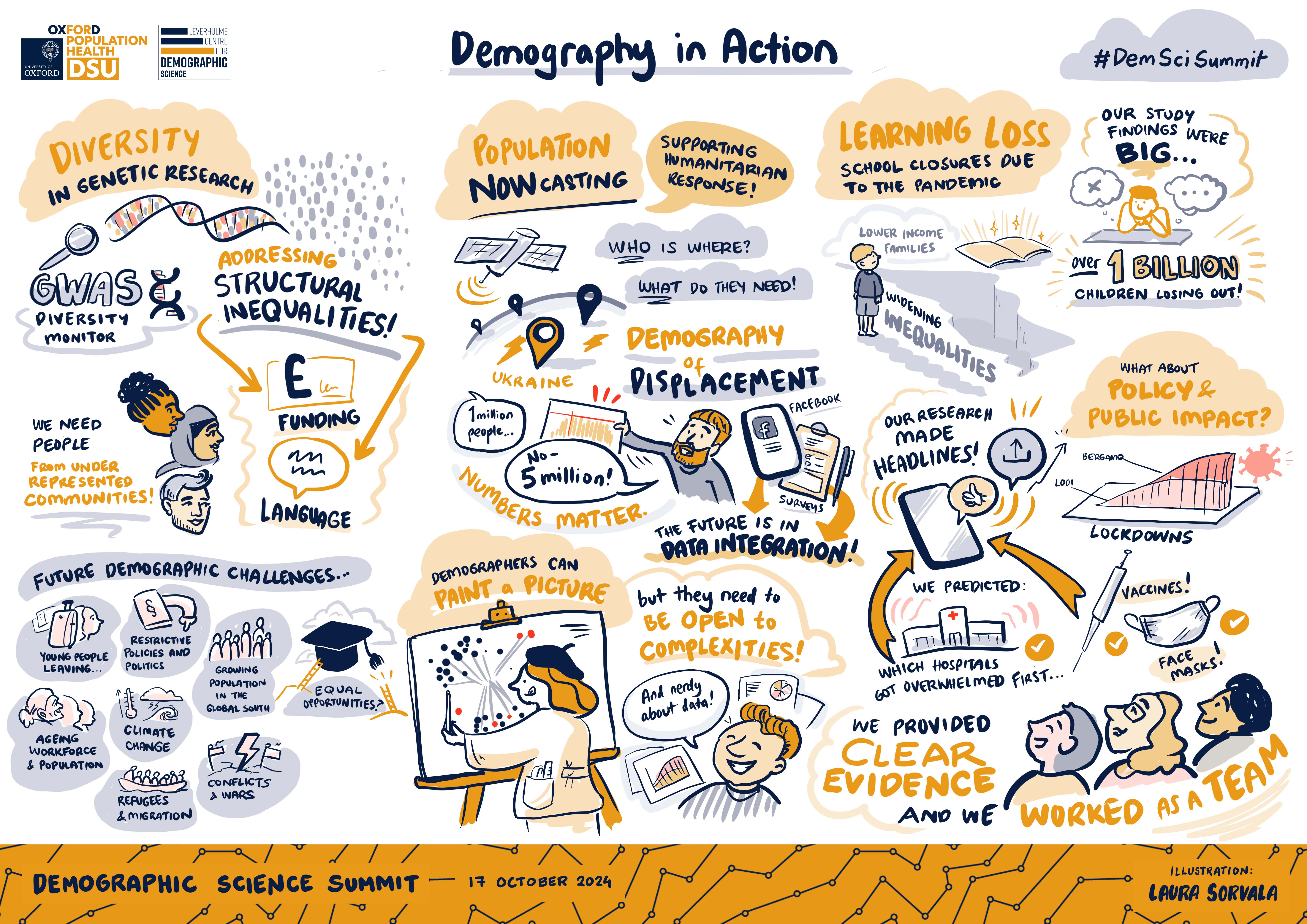
Demography and population health
‘Working together, researchers with an understanding of demography, health and populations can really make a difference in coming up with creative solutions to tough problems. It’s exciting, and I’m really glad to see the work being done at the Centre.’ – Bill Morneau, former Finance Minister of Canada (2015-2020) and former CEO of Morneau Shepell (now TELUS Health)
In this session, LCDS researchers showed how demography is shining a spotlight on the most challenging issues of our time such as stalling mortality and health trends in the UK (presented by Professor Jennifer Dowd), life expectancy and life span changes (Dr José Manuel Aburto), societal-level shocks and their impact on health and inequality (Dr Andrea Tilstra), and the impact of climate change on fertility (Dr Joshua Wilde). Dr Stefanía Benónísdóttir also presented on how the sociogenomics team at LCDS, led by Professors Melinda Mills and Augustine Kong, are using interdisciplinary insights to advance the field.
The panel discussion focused on the deep disciplinary expertise gained from academia (Jakub Bijak, Professor of Statistical Demography at the University of Southampton), heterogeneity (Christl Donnelly, Professor of Applied Statistics at the University of Oxford), and ageing and co-morbidities (Zhengming Chen, Richard Peto Professor of Epidemiology at Oxford Population Health).
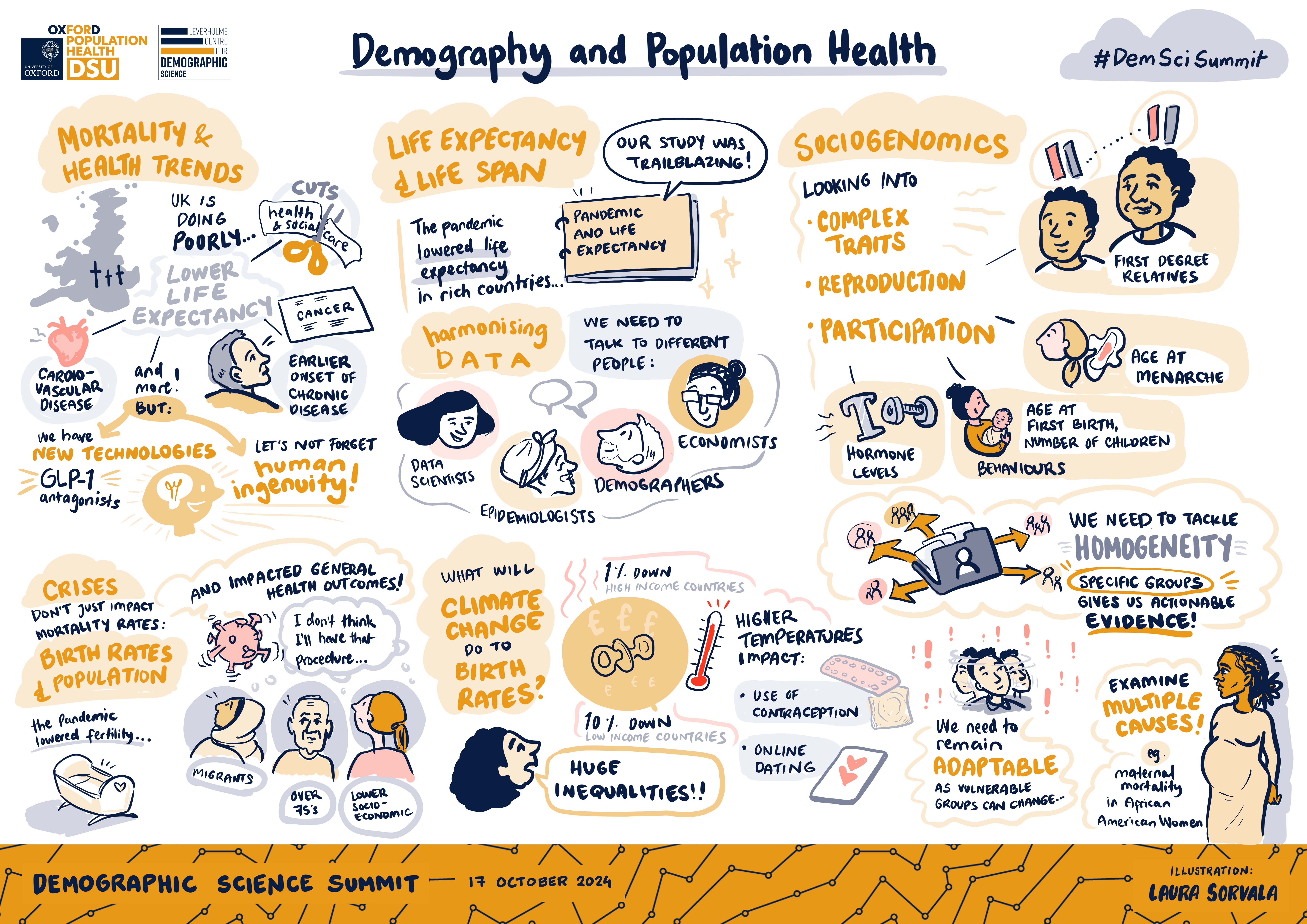
Disruptive Data for Disruptive Demography
‘Demography is at the forefront of many policy agendas. Now we need to translate all the amazing things researchers are doing with new data and technology into public policy. The summit and everything the Centre does will help accomplish that.’ – Dr Ana Isabel Moreno Monroy, LCDS Advisory Board member and Head of Regional Analysis and Statistics Unit at the Organisation for Economic Co-operation and Development (OECD)
The session focused on how the Centre is using data to disrupt and realign demography for the benefit of global populations. This includes the various data dashboards created by LCDS including Mapineq Link to address geospatial inequalities and the Data4Science startup (presented by Professor Melinda Mills) and Digital Gender Gaps project to track gender inequalities in a digital world (Professor Ridhi Kashyap). Other innovative uses of new data were presented for migration and family demography (Dr Francesco Rampazzo) and using machine learning to predict individual-level mortality (Dr Nick Irons) as well as to understand human behaviour (Dr Daniel Valdenegro).
All panelists – Arthur Soames (Chief Strategy Officer of Premise Data), Dr Ana Isabel Moreno Monroy (Head of Regional Analysis and Statistics Unit at OECD and LCDS Advisory Board Member) and Frans Willekens (Emeritus Professor of Demography at the University of Groningen) – agreed in the innovative use of data to disrupt demography. They also called for greater attention to regional differences, proper documentation of data and ethics of data use.
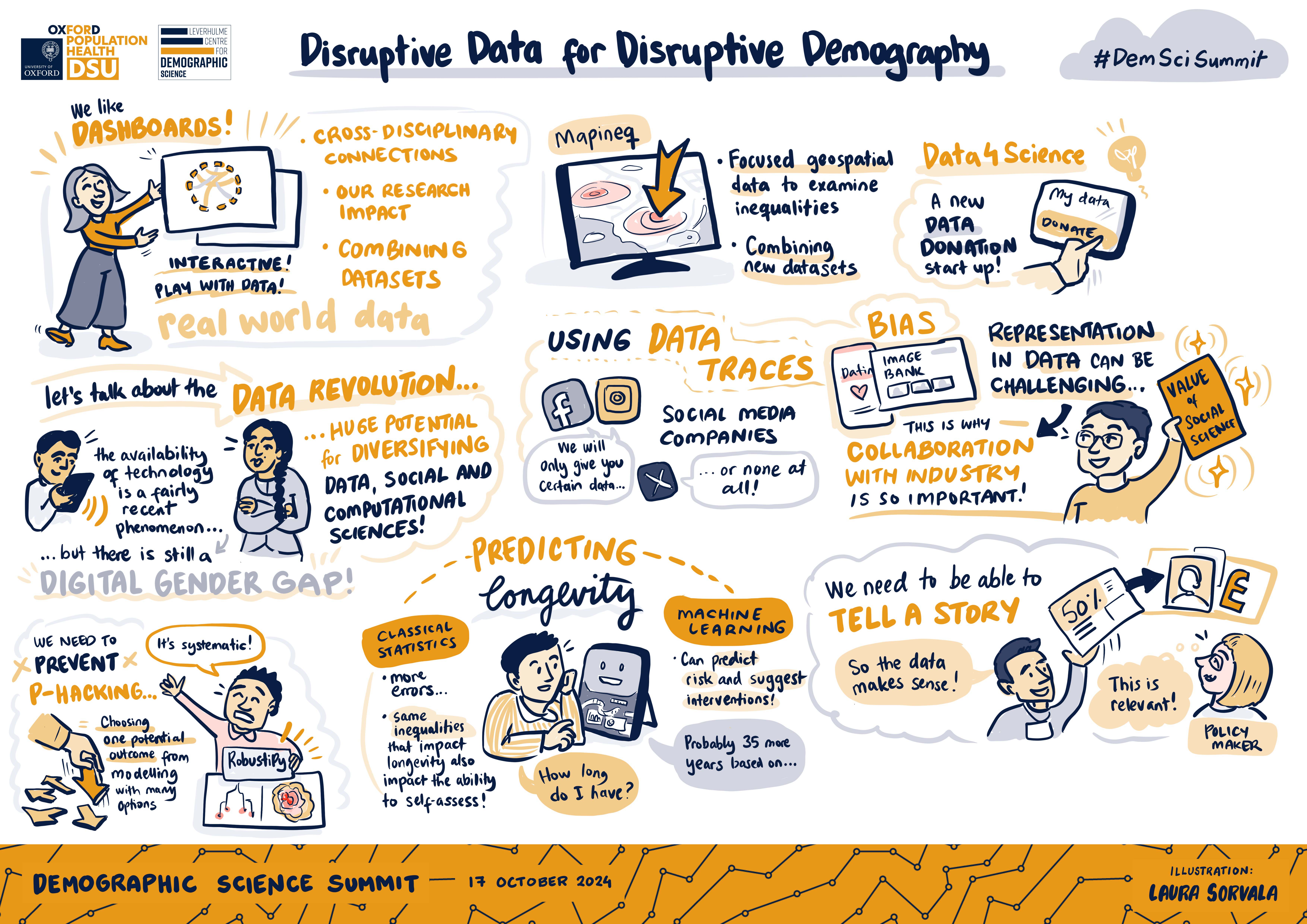
The next five years and beyond
‘I’m really excited in the next five years to see where the Centre is going to go. It’s done such pathbreaking research already in such a short period of time. If they can do what they’ve done so far, we’ll have some fantastic research coming out with real world policy impact.’ – Professor Julia Black, Warden at Nuffield College and President of the British Academy
Dr Sander Wagner, Senior Research Associate at LCDS, took us on an interactive journey on demography’s future and polled delegates on how the Centre could shape the next five years of demographic research. Diversity, health, climate change and migration were all key topics to come out of the session, as well as the use of digital and novel data, and importance of policy and communication.
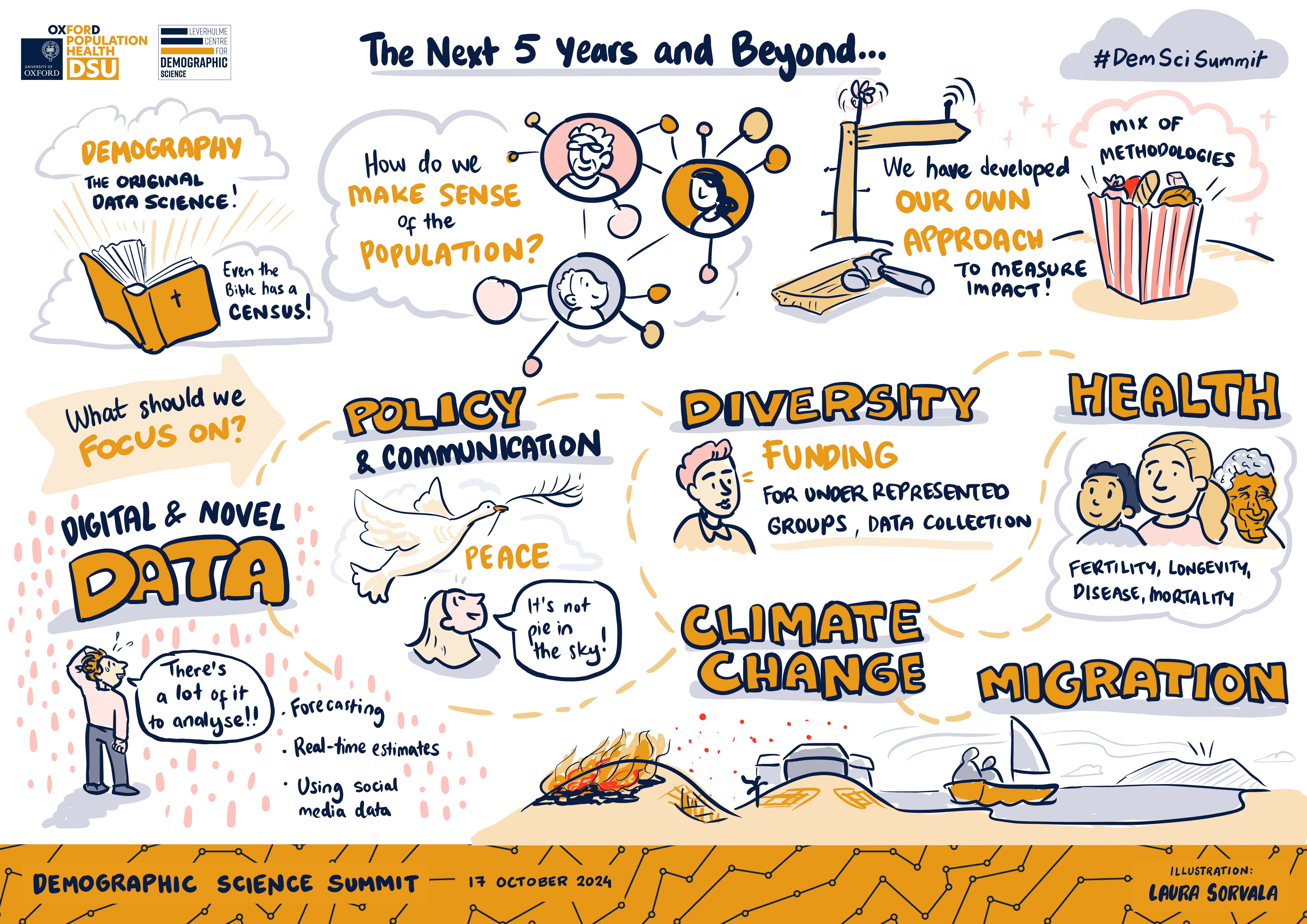
Closing remarks
‘The big thing for me is watching an entirely new generation of demographers come through the Centre and we’re so proud to be supporting that. Over the next five years, these early-career researchers are really going to make their mark which is wonderful to see.’ – Professor Anna Vignoles, Director of the Leverhulme Trust
The summit concluded by reflecting on the recent loss of our beloved and cherished PhD student Julia Mead Knox, and honoured her life by celebrating the achievements of early career demographers. Henrik-Alexander Schubert received The Julia Mead Knox Memorial Prize for Research in Demography and Population Health for his research Too Many Men? Subnational Population Imbalances and Male Childlessness in Finland. Naa Adjeley Mensah, LCDS scholarship student, received the finalist award for her research on Navigating Reproductive Goals and Female Agency in Contemporary Cultural Contexts: A Qualitative Study in Peri-Urban Ghana.
On receiving a unique 3D population pyramid of Finland as the award, Henrik-Alexander Schubert said, ‘My work studies the regional population structures and how they affect the level of childlessness in the Finnish population. I’m very happy and so surprised to hold the Finnish population in my hands! It’s amazing and this award means a lot to me.’
